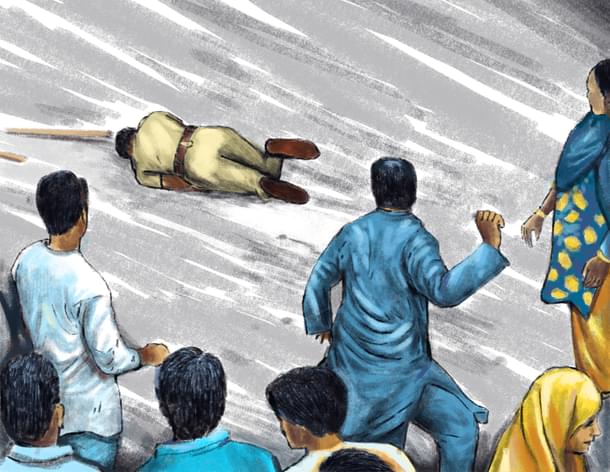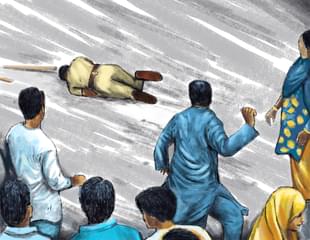Politics
Sure, #MuslimLivesMatter. But There’s An Abrahamic Brotherhood Of Imagined Traumas, Too
R Jagannathan
Jun 04, 2020, 02:47 PM | Updated 02:47 PM IST
Save & read from anywhere!
Bookmark stories for easy access on any device or the Swarajya app.


A few days ago, the hashtag #MuslimLivesMatter trended on microblogging site Twitter. This hashtag mirrored the American #BlackLivesMatter movement that seeks to draw attention to institutionlised racism in the police and other White-dominated institutions.
As #BlackLivesMatter trended again in America after the killing of George Floyd by a police officer in Minneapolis, who used his knee to hold Floyd down so that he couldn’t breathe, #MuslimLivesMatter trended in India. This is nothing but shameless use of another person’s tragedy to broadbase a victimhood narrative in India.
Between December 2019 and February this year, Muslim organisations and Lutyens 'Left-Liberals' converted the Citizenship Amendment Act (CAA) – enacted to provide early citizenship for persecuted Hindus and other minorities from Pakistan, Bangladesh and Afghanistan – into their own victimhood narrative. CAA does not impact any Indian Muslim, but a narrative of Hindu persecution in the neighbourhood was deliberately re-purposed to make it read like an attempt to persecute India’s Muslims.
Similarly, the Hindu-Muslim riots of north-east Delhi in February were converted into an “anti-Muslim pogrom”, a narrative the Western media was eager to buy into, even though both communities suffered.
In Narendra Modi’s first term, a few random acts of vandalism or theft in churches was converted into a story of “church attacks” and India’s Christian minorities under siege. It didn’t matter that during that same year (2014), such incidents, including burglary, were reported from more than 200 temples and many gurudwaras and mosques. But it was a Christian narrative of victimhood that prevailed.
Welcome to the Abrahamic brotherhood of imagined traumas and martyrdom.
At the outset, let us be clear. There is no need whatsoever to whitewash the crimes of people who lynch a cow-smuggler or justify attacks on thieves or child lifters from certain communities by vigilante groups belonging to another. But the universalisation of such incidents into general acts of intolerance and violence against Muslims and Christians is nothing but an egregious attempt to use the time-tested historical method of weaponising individual injustice and cases of persecution into larger tales of group martyrdom in order to target other communities and overawe the law.
The Romans had no problems with Christians worshipping their Jesus; it was the Christians who had a problem with the multitude of Roman gods. When Imperial Rome was all powerful, it surely must have led to the persecution of a few true believers who refused to honour Roman gods, including one or two being fed to the lions.
This is exactly what Candida Moss documents in her book, The Myth of Martyrdom: How Early Christians Invented a Story of Martyrdom. Moss, an authority on the New Testament and Christianity in the first 300 years, asserts that the actual number of years in which Christians were persecuted by the Romans was not more than 12, and most stories of Christians being fed to the lions and those involving individual martyrs were largely works of fiction created by the early Christians to solidify the faith and weaponise it into an expansionist force.
This willingness to weaponise martyrdom, whether real or fictional, also characterises Islam. Thus, the Shias have their martyrdom tales of Al-Huseyn Ibn Ali, grandson of the Prophet and son of the fourth Caliph, who was killed in Karbala after Yazid, the Umayyad successor after Muawiya, got the Governor of Iraq to capture Huseyn and kill him and his followers.
The Sunnis, for their part, see the early rejection of their Prophet in Mecca as persecution, but not the subsequent destruction of all the idols at the Kaaba after his triumphant return from Medina. It is presumed that the Prophet actually helped the Meccans by destroying their idols and ignorance. No trauma of those who believed in worshipping those idols is acknowledged.
The entire jihadi culture is based on encouraging suicide killings and then creating tales of martyrdom and persecution to force ordinary Muslims to band together against enemies, whether real or imaginary.
The Marxist vision of the world is also one based on imaginary victimhood based on a partial reality. In the Marxist worldview, the working class is always seen as victim of capitalism and capitalists, where no justification is needed to practise violence against class enemies. The Marxists view the welfare state as a diversion to prevent the victims from seeing themselves as victims.
It is interesting to note that even in Freudian psychology, the individual is seen as a victim of his past, where childhood traumas are given as the reason for present-day criminal behaviour. Thus, a paedophile is as much a victim as a victimiser, since he may have been molested as a kid by his father or some close relative.
Freudian psychology is rooted in notions of prior victimhood. The individual is given almost no power of agency, even though for every paedophile traumatised in childhood there will be scores of others who do not carry their victimhood into adult lives and become paedophiles.
A Freud contemporary, Alfred Adler, in fact posits the opposite theory. Adler says that traumas are often imagined or invented in order to feel safe in a sense of victimhood, which then can provide justification for your own crimes and lack of effort to lift yourself out of morass.
Adler has said: “No experience is in itself a cause of our success or failure. We do not suffer from the shock of our experiences – the so-called trauma – but instead we make out of them whatever suits our purposes. We are not determined by our experiences, but the meaning we give to them.”
(Note: I have sourced both the Freud and Alfred Adler positions, including the quote attributed to the latter, from a book by Ichiro Kishimi and Fumitake Koga, The Courage To Be Disliked, which urges people to embrace the Adlerian position and leave behind victimhood feelings that immobilise you.)
This Adler theme is indirectly reflected in karma theory, where one’s current status is not related to being victimised by others, but by the one’s own past actions. Of course, it would be unreasonable and wrong to explain one’s status today – of poverty or sickness – to crimes committed in a previous life of which one can know nothing, but the positive aspect of this is that you cannot blame your predicament on others.
Karma requires you to do the right thing now so that you don’t suffer in future. This means the fortunate must put their fortune to back good deeds, and the less fortunate must make efforts to lift themselves out of poverty and illiteracy. Karma is not about accepting fate – though that may be one aspect of it – but about today’s deeds determining your future. There is no scope for wallowing in a permanent sense of victimhood.
Romila Thapar, who has devoted a lifetime to denying the religious iconoclasm of India’s Islamic rulers and invaders, says in her book Somanatha that the destruction of the temple and its idols multiple times by Ghazni and Ghori did not traumatise Hindus, for there is little written evidence about this from the Hindu side. What she missed was the obvious: the Indic attitude to loss and trauma is to rebuild and forget rather than use it to weaponise anger.
That came much later, when Hindus realised that both Abrahamic religions did not accept their truths as equally valid and were out to eviscerate them. This was what forced Hindus to seek to revive memories of old and nearly forgotten traumas, from the destruction of an older temple by Babur’s general in Ayodhya, to forced conversions of Tipu Sultan in southern India.
The other side of the Abrahamic tendency (and this includes the Marxist Left) to seek permanent victimhood status is to deny the real traumas of the “other”. Thus, the occasional excesses of the Indian armed forces in Jammu and Kashmir will feed into an exaggerated sense of victimhood and trauma for Muslim Kashmiris, but the ethnic cleansing of 400,000 Kashmiri Hindus will be ignored and, if possible, blamed on Hindus themselves.
You can’t persist with your aggressive anti-CAA stance if you even admit that Hindus can be persecuted by Muslims in three neighbouring countries. Every case of a Muslim being lynched in India also feeds the same martyrdom narrative, but similar killings of a Kamlesh Tiwari or a Ramalingam in Tamil Nadu, not to speak of the many murders of RSS workers, will be dismissed as just one of those things, or exaggerated crimes.
The logic of accepting one’s own sufferings as real but not those of others is simple: if you accept both possibilities, you can’t then weaponise your own narrative of martyrdom, an ever-present Abrahamic ruse to mobilise people for conquest and violence.
Globally, Palestinian Muslims are victims, never the perpetrators of unspeakable crimes against Israel. Thus, they have the right to statehood, but not Israel. In the Indian context, only Christians and Muslims have the right to victimhood narratives, never the rest.
This is why an Irfan Habib will lie through his teeth to deny a temple ever existed below the Babri structure, and an Audrey Truschke will write books to humanise Aurangzeb and Tipu Sultan, dismissing their apparent bigotry and iconoclasm to mere political acts.
One does not have to deny that both Aurangzeb and Tipu were more than just anti-Hindu bigots; they would surely have had their positive sides, but then why does one not emphasise Hitler’s human qualities too? Why were his holocausts not just political acts of revenge in a nation defeated in the First World War?
The word “whataboutery” has been evolved precisely in order to exaggerate one kind of crime against members of “minorities” while dismissing crimes committed by the same “minorities” against others. #BlackLivesMatter could be about emphasising the need to reverse institutionalised racism in the US, but often it means the right to practise reverse racism against the White majority.
The message to India’s alleged minorities is simple: victimhood narratives do not have real value unless the idea is to demonise Hindus and to weaponise your own faith. If that happens, you cannot stop Hinduism itself (or slogans like Jai Shri Ram) from being weaponised in defence.
The aggressive courting of Abrahamic martyrdom is largely fake, and is a recipe for violence. India’s minorities must introspect where this aggressive use of martyrdom narratives is taking the country.
Jagannathan is former Editorial Director, Swarajya. He tweets at @TheJaggi.




